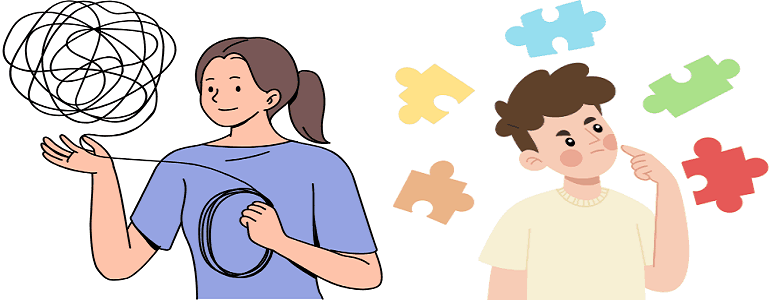Table of Contents
- Introduction
- How Sudoku Develops Logical Reasoning
- The Key Logical Skills You Develop with Sudoku
- Pattern Recognition and Problem-Solving
- Deductive Reasoning and Analytical Thinking
- Decision-Making and Strategic Thinking
- Tips to Use Sudoku as a Brain-Training Tool
- Start with the Right Level
- Practice Different Variants
- Focus on Process, Not Speed
- Conclusion: Play Sudoku, Strengthen Your Mind
- FAQ
1. Introduction
What if I told you that a simple 9×9 grid of numbers could rewire your brain for sharper thinking? Sounds like a stretch, right? But Sudoku isn’t just a game—it’s a mental gym where logic gets a serious workout. Whether you’re a casual player or an aspiring puzzle master, Sudoku can fine-tune your reasoning skills, one puzzle at a time.
2. How Sudoku Develops Logical Reasoning
Sudoku isn’t about crunching numbers—it’s about spotting patterns, making deductions, and thinking methodically. Every puzzle challenges you to analyze, strategize, and make decisions based on logic rather than guesswork. Over time, this strengthens the cognitive muscles that help you think more clearly in everyday situations.
Plus, Sudoku trains your brain to break problems into smaller, more manageable parts. Instead of feeling overwhelmed, you learn to tackle challenges step by step—just like solving a complex puzzle.
3. The Key Logical Skills You Develop with Sudoku
3.1 Pattern Recognition and Problem-Solving
Ever noticed how seasoned Sudoku players scan a grid like detectives analyzing a crime scene? That’s because spotting number patterns is the key to cracking the puzzle. You learn to recognize recurring sequences, identify missing numbers, and predict possibilities—all essential problem-solving skills that come in handy beyond the game.
And here’s the kicker: this ability to detect patterns extends to real life. Whether it’s identifying trends at work or recognizing behavioral cues in conversations, Sudoku fine-tunes your ability to see what others might miss.

3.2 Deductive Reasoning and Analytical Thinking
Each empty cell in Sudoku is a riddle waiting to be solved. But there’s no room for wild guesses—only logic. You examine the available numbers, rule out impossibilities, and deduce the correct choice. This back-and-forth process trains your brain to think critically and analytically, making complex decisions easier.
Think of it like solving a mystery. You start with clues (the given numbers), eliminate suspects (impossible values), and arrive at the solution (the correct number). Over time, this type of thinking becomes second nature.

3.3 Decision-Making and Strategic Thinking
One wrong move in Sudoku can throw off the entire puzzle, much like a single bad decision can derail a plan. That’s why Sudoku sharpens your ability to think ahead. You assess options, weigh consequences, and choose the best course of action—a skill that proves invaluable in real-world decision-making.
From planning your budget to choosing the fastest route home, Sudoku’s strategic thinking exercises help you make smarter, more calculated choices in everyday life.

Besides improving your logical reasoning skills, there are numerous benefits of Sudoku. Follow this article to know more “The Secret Benefits of Playing Sudoku: What Science Says”.
4. Tips to Use Sudoku as a Brain-Training Tool
4.1 Start with the Right Level
Jumping straight into an expert-level puzzle is like trying to run a marathon without training—it’s not going to end well. Start with easy puzzles to build confidence and gradually move up. This step-by-step approach helps strengthen logical reasoning without frustration.
Download Sudoku puzzles of varying difficulty levels here.
4.2 Practice Different Variants
Classic Sudoku is fantastic, but have you tried Sudoku X, Windoku, or Killer Sudoku? Each variant challenges your brain in new ways, keeping your problem-solving skills sharp. Mixing it up prevents mental stagnation and keeps the learning curve exciting.
4.3 Focus on Process, Not Speed
Rushing through a puzzle often leads to mistakes, much like hasty decisions in real life. Instead of racing against the clock, focus on accuracy. Sudoku isn’t about how fast you finish—it’s about the logical journey to the solution. Learn some tips and techniques to help you in your journey.
5. Conclusion: Play Sudoku, Strengthen Your Mind
If you’re looking for a simple yet effective way to boost logical reasoning, Sudoku is your brain’s best friend. It trains you to think methodically, analyze problems from different angles, and make smarter decisions. Plus, it’s an enjoyable way to keep your mind sharp without feeling like work.
So, grab a puzzle, take your time, and let Sudoku do its magic. Your brain will thank you for it.
6. FAQ
Q1. Can Sudoku really improve logical reasoning?
Absolutely! Regular practice enhances pattern recognition, deduction, and strategic thinking, all of which are crucial for logical reasoning.
Q2. Is Sudoku beneficial for all ages?
Yes! Whether you’re a student, working professional, or retiree, Sudoku helps keep your brain active and engaged.
Q3. How long should I play Sudoku daily to see benefits?
Even 10–15 minutes a day can make a noticeable difference over time. It’s about consistency, not just difficulty level.
Q4. Is Sudoku better than other brain-training games?
Sudoku is unique because it relies purely on logic, unlike some other games that include memorization or reaction speed. This makes it particularly effective for sharpening reasoning skills.
Q5. Can Sudoku help with decision-making skills?
Yes! By training you to evaluate options and think critically, Sudoku helps you make better decisions in both small and significant matters.




